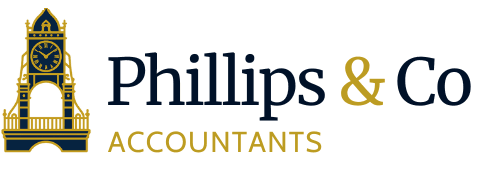Author: Phillips & Co Accountants, Chester
Date: 29 August, 2025
If this is your first Self Assessment (new sole trader, new landlord, or you’ve got untaxed income such as dividends or gains), you must register with HMRC by 5 October following the end of the tax year. Miss that and you risk delays getting your UTR and a last-minute scramble.
Key dates at a glance
Register with HMRC: by 5 October (first return only)
Paper return deadline: 31 October
Online return + first payment: 31 January
Second payment on account (if due): 31 July
Tax year: runs 6 April to 5 April
Example: For the year 6 April 2023–5 April 2024, register by 5 Oct 2024, file online by 31 Jan 2025, and (if payments on account apply) pay again 31 Jul 2025.
Who must register?
You usually need to register if any of the following apply:
You became self-employed (sole trader).
You receive rental income.
You have untaxed income (e.g., significant dividends, investment income, capital gains).
HMRC has asked you to complete a return.
Company directors don’t automatically need a return—only if HMRC requires one or you have untaxed income.
How to register (step-by-step)
Create a Government Gateway account (if you don’t already have one).
Choose the right form:
CWF1 if you’re self-employed.
SA1 if you’re not self-employed (e.g., landlords, investors).
HMRC will post your Unique Taxpayer Reference (UTR) to your address (typically ~10 working days in the UK).
Add Self Assessment to your online account and keep your activation code safe.
Keep records and file by the deadlines.
What you’ll need: NI number, full name/address, contact details, date trading started (if self-employed), business type, and a brief description of your income (e.g., rental).
Payments on account (POA) — do they apply to you?
If your last Self Assessment bill is over £1,000 and less than 80% of your tax is collected at source, HMRC usually asks for advance payments towards next year’s bill:
31 January: first POA (usually 50% of last year’s income tax/Class 4).
31 July: second POA (the other 50%).
31 January (next): balancing payment (and next year’s first POA).
If your current year’s income is lower, we can apply to reduce POAs. If it turns out too low, HMRC charges interest on the shortfall—so it’s worth getting the numbers right.
Why filing early helps
Certainty: know your bill months sooner and budget with confidence.
Time to fix: resolve paperwork issues without the January rush.
Penalty protection: reduce the risk of late filing/late payment fees.
Cash-flow planning: check (and, where justified, reduce) payments on account.
Records to keep (and how long)
Income records, expense receipts (digital is fine), bank statements.
Mileage logs (date, purpose, start/finish, miles).
Landlords: agent statements, repairs vs improvements, mortgage interest.
Keep records: at least 22 months after the end of the tax year (or 5 years after 31 January if self-employed).
Common first-timer mistakes
Waiting until December/January to register (UTR delays).
Missing allowable expenses (software, mobile, use of home, mileage).
Confusing repairs (deductible) with improvements (capital).
Ignoring payments on account until the bill arrives.
Assuming paper receipts are required (digital copies are fine).
How Phillips & Co can help (Accountants Chester)
Register you correctly (CWF1/SA1) and set up Self Assessment.
Prepare and file your return on time.
Check every relief and allowable expense you’re entitled to.
Explain your bill and payments on account in plain English.
Fixed fees. No surprises.
If you’d like expert guidance, contact Phillips & Co Accountants Chester today.
Keep More, Stress Less
Disclaimer
The information contained in this blog is for general guidance only. It does not constitute professional advice and should not be relied upon as such. Always seek tailored advice from a qualified accountant regarding your specific circumstances.
